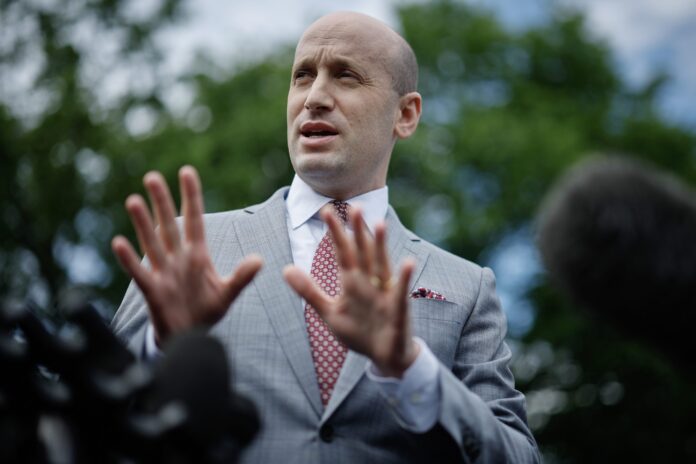The Clash of Immigration Policy and Economic Reality Under the Trump Administration
The Trump administration’s aggressive stance on immigration enforcement has created a tumultuous landscape where business owners grapple with a dwindling workforce, raising questions about economic viability. The prospect of mass deportations, a key campaign promise of Donald Trump, looms large, potentially jeopardizing the very fabric of the U.S. economy.
Repercussions for the Agriculture Sector
Recent high-profile immigration raids have sent shockwaves through industries reliant on immigrant labor, particularly agriculture. Workers, fearing deportation, are increasingly hesitant to show up, resulting in unpicked crops and unattended livestock. Reporting from Bloomberg reveals that the impact of these raids has left vital agricultural tasks undone—cows remain unmilked and fields fallow, threatening food supply and stability.
Trump has acknowledged the concerns of farmers and hotel owners, many of whom warn that the removal of undocumented workers—integral to their operations—could lead to severe labor shortages that are nearly impossible to replace. In a post on Truth Social, he referenced complaints from these industries, signaling an awareness of the economic implications of stringent immigration policies.
A Brief Reprieve and Rapid Reinforcement
In a surprising twist, Trump attempted to introduce a pause in enforcement targeted at sectors like hospitality and agriculture, recognizing the economic pressures compelling industry leaders to voice their discontent. However, this reprieve was short-lived; Trump swiftly reverted to a hardline stance, advocating for intensified raids particularly in Democratic-controlled states. His directive to ICE reflects a continued commitment to what he characterized as an unprecedented mass deportation initiative.
The Political Divide
The stark dichotomy within the Republican Party has been laid bare. While many business leaders urge a more nuanced approach to immigration enforcement—one that acknowledges the necessity of a stable workforce—there remains a fervent base of immigration hardliners who see uncompromising enforcement as essential to Trump’s vision.
Emily Knight, CEO of the Texas Restaurant Association, encapsulates the prevailing sentiment of fear among restaurant owners. “The fear is not only that the workforce won’t come, but also that customers will stay home,” she stated, emphasizing the broader economic repercussions stemming from these fears.
Ted Pappageorge, head of the Culinary Workers Union Local 226, expressed incredulity at the notion of deporting essential workers, asserting that such actions could jeopardize economic stability. His organization, serving a diverse membership, highlights the critical role immigrants play in sustaining the hospitality sector.
The Immigrant Workforce in Food Production
Statistically, immigrants constitute a significant portion of the food production workforce, with about one in five food production workers hailing from immigrant backgrounds. In some sectors, such as the dairy industry, this figure exceeds 50%. The implications of such dependency become clear when looking at ICE raids that indiscriminately target workers regardless of their legal status.
A shocking raid at a New Mexico dairy farm illustrates the extent of the enforcement crackdown—half the workforce was arrested while on duty. Beverly Idsinga, executive director of Dairy Producers of New Mexico, reported a rapid decline in staffing, forcing the dairy owner to reconsider operational viability, resorting to temporary help from high school students.
Pushback from Within
The fallout from aggressive immigration enforcement has even prompted Republican lawmakers to voice their concerns. Representatives such as David Valadao have urged Trump to prioritize the deportation of criminal elements rather than lawful workers who contribute positively to their communities. Similarly, House Agriculture Chair G.T. Thompson called for a more rational approach, emphasizing the need to avoid disrupting the food supply chain.
Yet, as the clash between Trump’s base and business interests grows, there are indications that some GOP members are advocating for expansion in visa programs for immigrant workers. This reflects a recognition of the reality that with unemployment rates at around 4%, it’s challenging for employers to fill essential low-skill roles without immigrant labor.
Ideological Divisions
Underlying this political battle is an ideological divide within the right. Stephen Miller, a key architect of Trump’s harsh immigration policies, has relentlessly pushed for strict enforcement, explicitly rejecting any concessions for industries reliant on immigrant labor. This uncompromising stance contrasts sharply with the pragmatic demands of business owners who rely on immigrant workers to maintain operations.
Despite these internal conflicts, characters such as Ira Mehlman of the Federation for American Immigration Reform advocate for a hard line, arguing for raising wages as a means to attract domestic labor. This viewpoint is not universally embraced; it runs counter to the immediate needs faced by employers who are desperate for workers.
Looking Ahead: Uncertain Outcomes
As the Trump administration continues to navigate this precarious situation, the feasibility of achieving mass deportations without severe disruption to the economy appears increasingly tenuous. The nation watches as employers face the consequences of opposing camps—the business imperative for reliable labor clashes with the uncompromising enforcement ideals of a significant segment of the Republican base.
The outcome of this struggle will shape the future of immigration policy, labor markets, and the overall economy, presenting challenges that neither side can afford to overlook. While the road ahead remains indeterminate, one thing is clear: the intricate interplay of immigration enforcement and economic stability is a story that continues to unfold.
